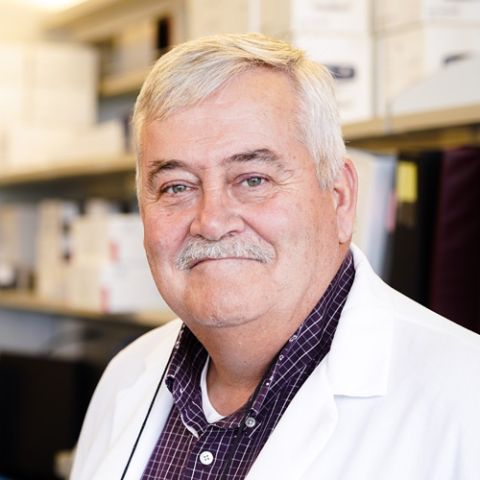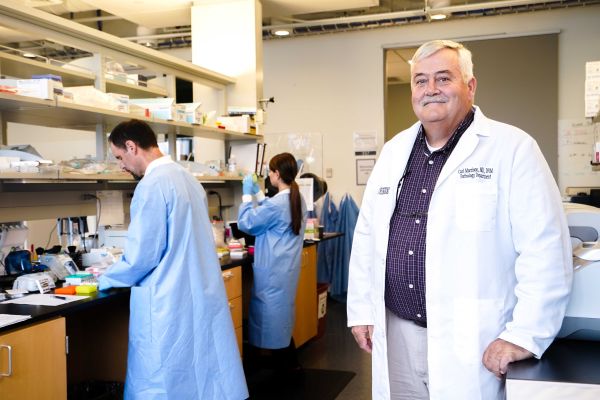An innovative blood test that will change the way we treat cancer
A routine blood test — combined with a novel, ultrasensitive technology developed at Roswell Park — could be the next innovation we’ve been waiting for to change the outcome of virtually all cancer patients.
Solid tumors like lung, breast and colon cancers begin in one specific place in the body, but all tumors secrete very small amounts of themselves into the blood stream. The Roswell Park Liquid Biopsy, developed by Roswell Park’s Department of Pathology, has the power to detect these trace amounts of cancer in the blood to help inform care teams how they should proceed with treatment.
There are a few different ways this technology could be applied to improve patient care everywhere.
- If surgery is employed to remove a tumor, this test could help determine growth in two ways.
- If the entire tumor was removed, this test can help determine if the cancer had already spread prior to surgery and is growing elsewhere in the body undetected.
- If the entire tumor was not removed, this test can help determine next steps.
- If the tumor was unintentionally not entirely removed through surgery, this test can alert the care team that more treatment or additional surgery will be needed.
- If the tumor could not be removed in its entirety for other reasons, this method could be employed to gauge tumor growth or reduction as further treatment carries on.
- For patients receiving treatments like chemotherapy and/or immunotherapy, this test can provide a routine analysis of the treatment’s success. The amount of trace tumor cells in the blood correlate to the growth or reduction of the tumor itself, indicating to the care team whether or not that treatment method is working for this patient’s cancer occurrence. This could be a more time efficient and less expensive way to make these determinations than the current method of employing a CT scan.
- Roswell Park Liquid Biopsy could also be used as a routine monitoring tool for cancer survivors to check for cancer recurrence.
Researchers at Roswell Park Comprehensive Cancer Center believe they have the answer.
Carl Morrison, MD, DVM, and his team of well-established researchers and clinicians are leading the development of this innovative method they’re calling the Roswell Park Liquid Biopsy. As Senior Vice President of Scientific Development and Integrative Medicine and Chair of the Department of Pathology & Laboratory Medicine, Dr. Morrison is committed to bringing the most advanced and effective care to Roswell Park patients. He believes the Roswell Park Liquid Biopsy is the dynamic, convenient and cost-effective solution we’ve been waiting for.
Dr. Morrison has already proven success in driving innovative, personalized medicine laboratory tests. With donor support, he led the creation of OmniSeq: comprehensive molecular and immune profiling mechanisms to help identify therapies that may be most effective for individual patients based on their genomic makeup. Roswell Park is one of only a few cancer centers to be able to routinely offer this testing.
How will a blood test help?
Healthy human cells secrete DNA into the blood. Cancer cells do the same, but that DNA will look different, just like how cancer cells look different from healthy cells in a patient’s body. Current tests in the industry can measure the mutated DNA in a patient’s blood to indicate whether the amount of cancer in their body is changing. Those existing methods are providing data with 15-20% accuracy.
Roswell Park Liquid Biopsy uses the same basic principle of measuring cell free DNA in the blood, but with proprietary technology that offers three to five times more accuracy than other methods, delivering data with 95% accuracy. Because the amount of healthy cell DNA vastly outnumbers the amount of cancer cell DNA in the blood, this ultrasensitive, novel technology is critical to provide reliable results for effective, dynamic monitoring of a patient’s cancer for their care team.
If a patient’s blood is tested after each treatment, their doctor can determine in real time if the cancer is increasing, decreasing or staying the same. After surgery, the test can help determine if there is still cancer in the patient’s body. There would be no need to wait months for an MRI or CT scan to see how the treatment is progressing; they could monitor the disease visit by visit, week to week.
“There’s still a lot of work to do here,” Dr. Morrison says, “but I really believe the technology we have will become a nationally accepted procedure.”
Two studies underway at Roswell Park
Two phase 1 studies are already underway at Roswell Park. In the first study, Dr. Morrison and his team are engaging in an observational, non-interventional study for patients whose cancer was removed by surgery. By collecting blood in the first 1 to 3 months after surgery, the Roswell Park Liquid Biopsy is used to determine if all their cancer was removed. Collection of blood will continue after this for up to two years or slightly more to detect any recurrence of cancer. This study, which primarily involves early-stage cancers, is designed to detect recurrence of cancer at the very earliest time, long before it could be detected by standard methods such as a CT scan, when a chance of successful treatment is much more likely.
“Since our test is designed to be significantly more sensitive than others, we should be able to prove it in very early-stage cancers,” Dr. Morrison explains.
The second study, which has more recently started, is for current patients with advanced disease. These patients will be monitored every three weeks during therapeutic treatment to watch for increasing, decreasing or plateaued levels of cell-free DNA. The goal of this study is to monitor response to treatment in real-time during each round of treatment whether it be chemotherapy, immunotherapy or a combination.
The goal is to have 1,000 patients on the first study and 250 on the second by June 2025, with plans to follow their progress for a minimum of two years. By early 2025, Dr. Morrison believes he and his team will have proven their concept works and shown its utility. While initially focusing on solid tumors, Dr. Morrison also looks forward to proving this technology will be effective for patients with blood cancers, as well, though the process may look slightly different for that group.
Beyond these initial clinical trial studies, the team anticipates approximately two additional years to prove their technology and another few years for the Roswell Park Liquid Biopsy to become a standard of care. Dr. Morrison is confident healthcare providers will be eager to adapt this cutting-edge technology once fully developed as a convenient, cost-effective method that benefits both the patient and the provider. Overall, this is a fast-paced and aggressive path toward higher quality cancer care, knowing we cannot waste time as cancer certainly does not.
“The Roswell Park Liquid Biopsy has the opportunity to change the treatment of cancer as much as anything I’ve ever witnessed in my life,” Dr. Morrison says.
We Need Your Support to Expand Reach and Advance Pace
Completely changing the landscape of cancer care does not come without cost. Dr. Morrison’s team estimates they will need approximately $3 million to carry them through their phase 1 studies. With donor support, the Roswell Park Liquid Biopsy technology has the potential to save lives, improve quality of life and ease the financial burden of cancer treatment on patients. This is unlike any advancement we have ever seen. You have the opportunity to be part of a new path in the fight against cancer.

